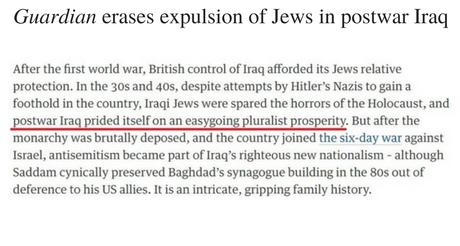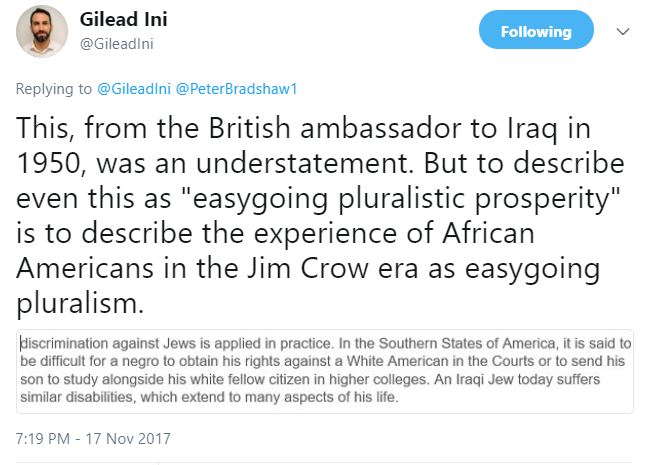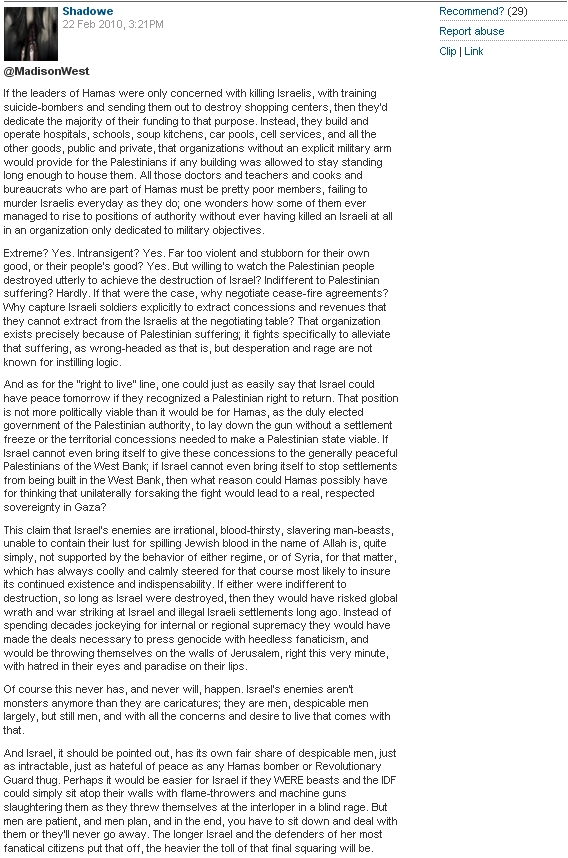Once again, the Guardian has erased a chapter within the well-documented ethnic cleansing of over 800,000 Jews from Arab countries in the mid 20th century. The latest example involves the history of Jews in Iraq, in the context of a short review by their film critic Peter Bradshaw of Fiona Murphy’s documentary ‘Remembering Baghdad’.
Here’s the entire Guardian review:
There is a potency and pungency to this brief, absorbing documentary about a part of Middle East history that is often passed over: the Jews of Iraq. It is a story that film-maker Fiona Murphy approaches by talking to those of the expatriate Iraqi Jewish community in London who yearn for their homeland.
After the first world war, British control of Iraq afforded its Jews relative protection. In the 30s and 40s, despite attempts by Hitler’s Nazis to gain a foothold in the country, Iraqi Jews were spared the horrors of the Holocaust, and postwar Iraq prided itself on an easygoing pluralist prosperity. But after the monarchy was brutally deposed, and the country joined the six-day war against Israel, antisemitism became part of Iraq’s righteous new nationalism – although Saddam cynically preserved Baghdad’s synagogue building in the 80s out of deference to his US allies. It is an intricate, gripping family history.
The suggestion that, until the Six Day War, Jews were spared antisemitic persecution in Iraq is simply a lie.
Lyn Julius, co-founder of Harif, an association of Jews from the Middle East and North Africa in the UK, responded on Facebook to the Guardian review:
You would have thought it a fantastic achievement that the documentary film ‘Remember Baghdad’ received a review by Peter Bradshaw in the Guardian after it played to a packed house at JW3 yesterday. But I’m wondering if the film Bradshaw reviewed is the same one as I saw – or maybe he just fell asleep halfway through. ‘Iraqi Jews were spared the horrors of the Holocaust’, he writes. I would have thought the Nazi-inspired Farhud in 1941 was a pretty horrific Holocaust-related event myself, with its death toll of hundreds. Bradshaw skips over the hardships of the late 1940s, with open persecution of the Jews leading to the mass emigration of 90 percent of the community. He claims that antisemitism in Iraq had only become a problem after the Six Day War ‘although Saddam cynically preserved Baghdad’s synagogue building in the 80s out of deference to his US allies’. Huh? That is hardly the most salient feature of Saddam’s policy, which included arrest, torture and execution of Jews, who once had over 50 synagogues in Baghdad alone. Altogether, a shoddy and ignorant job unworthy of the film, and probably rushed out in 15 mins before the Guardian went to press.
Our CAMERA colleague Gilead Ini fired off several tweets to the Guardian journalist:
Ini, in a post last week responding to a NY Times article with a similarly misleading claim about Iraq’s Jews, explained:
While it is true that the small fraction of Iraqi Jewry remaining in Iraq in the late 1960s endured a severe round of anti-Jewish activity, it is a brazen revision of history to claim this was the turning point at which the country “became inhospitable.” (A note about language: While we follow the newspaper’s lead in referring to “hospitality,” in this context the word itself can be misleading. Jews were not guests in Iraq. Their neighbors and government were not hosts. Babylonian Jews were part of the fabric of the land for thousands of years, long preceding the Muslim and Arab conquest of the region.)
Conditions for Jews in modern Iraq took a turn for the worse in the 1930s when, influenced by the Nazis, the country enacted restrictive laws, barred Jewish students from schools, and dismissed Jews from certain jobs. In 1941, a brutal anti-Jewish massacre in Baghdad known as the farhud claimed about 200 lives and shattered the community’s sense of security. And in the early 1950s, nearly all of the country’s Jews escaped the intolerable conditions there.
In 1949, 130,000 Jews lived in Iraq in 1949. Three years later, after 95 percent of the community fled what they clearly considered an inhospitable country, perhaps 10,000 remained. (For a more detailed account of the persecution of Iraqi Jews, see here.)
CAMERA has contacted the Guardian’s readers’ editor to seek a correction to this egregious historical inaccuracy.









